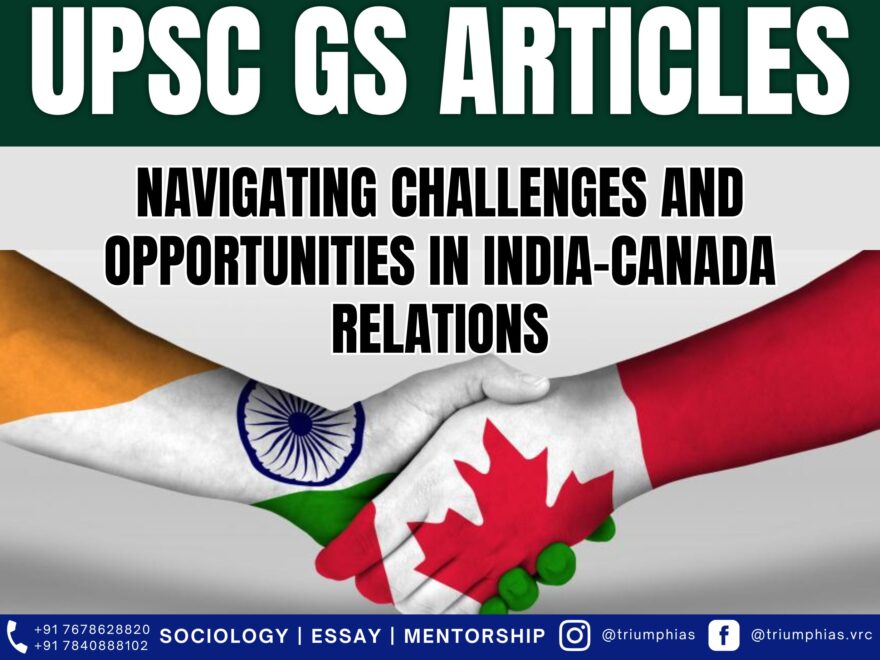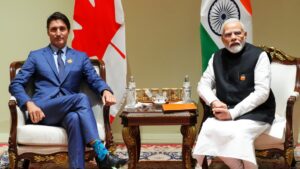Dawn phase of India Canada ties
(Relevant for General Studies Paper Prelims/Mains)
Dawn phase of India Canada ties
Recently, the Canadian government took the step of expelling a senior Indian diplomat, alleging India’s involvement in the assassination of a prominent Sikh Canadian leader, Hardeep Singh Nijjar, within Canadian borders. In response, India promptly issued a statement refuting any involvement in the matter and expelled a senior Canadian diplomat in return.
In light of these developments, it is imperative to delve into the importance of Indo-Canadian relations and identify the challenges that require joint efforts to strengthen and sustain their bilateral relationship.
Base of India-Canada relationship
- Political Relations: India established diplomatic ties with Canada in 1947. India and Canada share a longstanding bilateral relationship founded on common values such as democracy, human rights, the rule of law, and diversity.
- Economic Cooperation: Historically, the annual bilateral trade volume between India and Canada reached $6 billion, while Indian investments in Canada exceeded $4 billion. Invest India reports that Canada ranks as the 18th largest foreign investor in India, with a total investment of approximately $3,306 million from April 2000 to March 2023. Over 600 Canadian companies maintain a presence in India, and more than 1,000 Canadian firms actively pursue business opportunities in the Indian market. Both nations are currently engaged in technical negotiations for a Comprehensive Economic Partnership Agreement (CEPA), which covers trade in goods, services, investments, and trade facilitation.
- Diaspora Connections: Canada is home to one of the world’s largest Indian diasporas, with a population of 1.6 million people of Indian origin, constituting over 3% of the total Canadian populace and 700,000 Non-Residential Indians (NRIs).
- Education and Innovation: Indian students studying in Canada now make up nearly 40% of the entire international student population in Canada. Canada’s Intellectual Property Office and India’s Department of Industrial Policy and Promotion (DIPP) have agreed to enhance cooperation in the realm of Intellectual Property Rights (IPR).
- Strategic Importance: As part of its Indo-Pacific strategy to diversify the Canadian economy, India holds a crucial role, considering the nation’s growing economic and demographic significance in the region.
- Science and Technology: Under the IC-IMPACTS program, the Department of Biotechnology is overseeing joint research initiatives in healthcare, agri-biotech, and waste management. IC-IMPACTS, recognized as the Canada-India Research Centre of Excellence, stands as the first and only initiative of its kind.
- Space: ISRO and the Canadian Space Agency (CSA) have entered into Memorandums of Understanding (MOUs) pertaining to the exploration and use of outer space. ANTRIX, ISRO’s commercial arm, has launched numerous nano satellites from Canada. During ISRO’s 100th Satellite PSLV launch in 2018, the Indian space agency carried Canada’s first Low Earth Orbit (LEO) satellite from the Sriharikota spaceport.
Challenges of the India Canada Relationship
Navigating Challenges in Indo-Canadian Relations:
- Cultural Sensitivities: India’s leadership has raised apprehensions regarding certain fringe groups within the Sikh community in Canada that continue to advocate for an independent Sikh state, known as Khalistan, separate from India. Canada allowed a parade that depicted the 1984 assassination of the Indian Prime Minister, India Gandhi, by her bodyguards. This portrayal was viewed as glorifying violence by Sikh separatists. Michael Fugleman, director of the South Asia Institute at the Wilson Center think-tank, asserts that the convergence of heightened Sikh activism in Canada, mounting Indian pressure on Ottawa, and Ottawa’s reluctance to address Indian concerns has “plunged bilateral relations into a profound crisis at present.”
- Visa and Immigration Policies: In recent times, reports have emerged of Indian students encountering challenges in securing visas for studying in Canada, leading to dissatisfaction and apprehension in India.
- Differing Stances on International Issues: During the G20 meeting in New Delhi, Canada and India did not engage in direct bilateral talks but rather met on the sidelines. Divergent viewpoints on matters such as the political situation in Kashmir have strained diplomatic relations.
- Agricultural Trade Disputes: Indian dairy and poultry producers have raised trade-related concerns regarding Canadian exports of products like pulses and canola oil.
What could be done?
- Addressing the Khalistan Issue: Facilitate an open and inclusive dialogue involving all relevant parties, including representatives from the Sikh community, Indian government officials, and Canadian authorities. Both nations should implement legal measures to tackle any instances of political extremism.
- Economic Diversification: Diversifying trade by expanding into non-traditional sectors such as emerging technologies, renewable energy, and healthcare can create fresh opportunities for collaboration and economic expansion.
- Cultural Exchange: Promoting programs for cultural exchange, art exhibitions, and film festivals can nurture a deeper appreciation for each other’s cultural heritage and traditions.
- Environmental Cooperation: In light of their shared commitment to combating climate change, India and Canada can collaborate on green technologies, sustainable development, and renewable energy ventures.
- Diplomatic Engagement: Regular high-level diplomatic dialogues and exchanges can facilitate the alignment of their positions on global matters and foster mutual understanding.
- Security Cooperation: Strengthening cooperation in counter-terrorism efforts, particularly through the Joint Working Group (JWG) on Counter-Terrorism, can enhance security measures and responses.
Both India and Canada must endeavor to transcend politically contentious issues and focus on areas of mutual cooperation and collaboration. The future holds great promise for this dynamic partnership, and both nations must seize the opportunities it presents.
Reference The Hindu
Frequently Asked Questions:
- Question: What recent diplomatic actions strained India-Canada relations?
Answer: The expulsion of senior diplomats over allegations of India’s involvement in a Sikh leader’s assassination.
2. Question: What are the key foundations of the India-Canada relationship?
Answer: The relationship is built on political ties, economic cooperation, diaspora connections, education, and shared values.
3. Question: What is the significance of the Indian diaspora in Canada?
Answer: The Indian diaspora in Canada comprises 1.6 million people, constituting over 3% of the Canadian population.
4. Question: How can India and Canada diversify their economic collaboration?
Answer: They can explore non-traditional sectors like emerging technologies, renewable energy, and healthcare.
5. Question: What are the challenges in India-Canada relations related to the Sikh community?
Answer: Challenges include concerns over Khalistan advocacy and controversial events, like a parade depicting Indira Gandhi’s assassination.
6. Question: How can India and Canada enhance their cultural exchange?
Answer: Promoting programs like art exhibitions and film festivals can foster a deeper appreciation of cultural heritage.
7. Question: What issues have strained diplomatic relations between Canada and India?
Answer: Divergent viewpoints on international matters like the political situation in Kashmir have caused strains.
8. Question: What should be done to address the Khalistan issue?
Answer: Facilitate an open and inclusive dialogue involving relevant parties and implement legal measures against political extremism.
9. Question: How can India and Canada collaborate on environmental initiatives?
Answer: They can work together on green technologies, sustainable development, and renewable energy projects.
10. Question: What is the potential role of the Joint Working Group on Counter-Terrorism in India-Canada relations?
Answer: It can enhance security cooperation and measures to combat terrorism.
GS Related Practices Questions…
To master these intricacies and fare well in the Sociology Optional Syllabus, aspiring sociologists might benefit from guidance by the Best Sociology Optional Teacher and participation in the Best Sociology Optional Coaching. These avenues provide comprehensive assistance, ensuring a solid understanding of sociology’s diverse methodologies and techniques.
India-Canada relations, diplomatic ties, economic cooperation, cultural exchange, environmental cooperation, security cooperation, challenges, solutions, bilateral relationship, India-Canada relations, diplomatic ties, economic cooperation, cultural exchange, environmental cooperation, security cooperation, challenges, solutions, bilateral relationship.

Why Vikash Ranjan’s Classes for Sociology?
Proper guidance and assistance are required to learn the skill of interlinking current happenings with the conventional topics. VIKASH RANJAN SIR at TRIUMPH IAS guides students according to the Recent Trends of UPSC, making him the Best Sociology Teacher for Sociology Optional UPSC.
At Triumph IAS, the Best Sociology Optional Coaching platform, we not only provide the best study material and applied classes for Sociology for IAS but also conduct regular assignments and class tests to assess candidates’ writing skills and understanding of the subject.
Choose The Best Sociology Optional Teacher for IAS Preparation?
At the beginning of the journey for Civil Services Examination preparation, many students face a pivotal decision – selecting their optional subject. Questions such as “which optional subject is the best?” and “which optional subject is the most scoring?” frequently come to mind. Choosing the right optional subject, like choosing the best sociology optional teacher, is a subjective yet vital step that requires a thoughtful decision based on facts. A misstep in this crucial decision can indeed prove disastrous.
Ever since the exam pattern was revamped in 2013, the UPSC has eliminated the need for a second optional subject. Now, candidates have to choose only one optional subject for the UPSC Mains, which has two papers of 250 marks each. One of the compelling choices for many has been the sociology optional. However, it’s strongly advised to decide on your optional subject for mains well ahead of time to get sufficient time to complete the syllabus. After all, most students score similarly in General Studies Papers; it’s the score in the optional subject & essay that contributes significantly to the final selection.
“A sound strategy does not rely solely on the popular
Opinion of toppers or famous YouTubers cum teachers.”
It requires understanding one’s ability, interest, and the relevance of the subject, not just for the exam but also for life in general. Hence, when selecting the best sociology teacher, one must consider the usefulness of sociology optional coaching in General Studies, Essay, and Personality Test.
The choice of the optional subject should be based on objective criteria, such as the nature, scope, and size of the syllabus, uniformity and stability in the question pattern, relevance of the syllabic content in daily life in society, and the availability of study material and guidance. For example, choosing the best sociology optional coaching can ensure access to top-quality study materials and experienced teachers. Always remember, the approach of the UPSC optional subject differs from your academic studies of subjects. Therefore, before settling for sociology optional, you need to analyze the syllabus, previous years’ pattern, subject requirements (be it ideal, visionary, numerical, conceptual theoretical), and your comfort level with the subject.
This decision marks a critical point in your UPSC – CSE journey, potentially determining your success in a career in IAS/Civil Services. Therefore, it’s crucial to choose wisely, whether it’s the optional subject or the best sociology optional teacher. Always base your decision on accurate facts, and never let your emotional biases guide your choices. After all, the search for the best sociology optional coaching is about finding the perfect fit for your unique academic needs and aspirations.
To master these intricacies and fare well in the Sociology Optional Syllabus, aspiring sociologists might benefit from guidance by the Best Sociology Optional Teacher and participation in the Best Sociology Optional Coaching. These avenues provide comprehensive assistance, ensuring a solid understanding of sociology’s diverse methodologies and techniques. Sociology, Social theory, Best Sociology Optional Teacher, Best Sociology Optional Coaching, Sociology Optional Syllabus.
Best Sociology Optional Teacher, Sociology Syllabus, Sociology Optional, Sociology Optional Coaching, Best Sociology Optional Coaching, Best Sociology Teacher, Sociology Course, Sociology Teacher, Sociology Foundation, Sociology Foundation Course, Sociology Optional UPSC, Sociology for IAS,
Follow us :


https://t.me/VikashRanjanSociology
Find More Blogs
|
Scope of the subject and comparison with other social sciences |
|||
|
|
|
|
Modernity and social changes in Europe |



